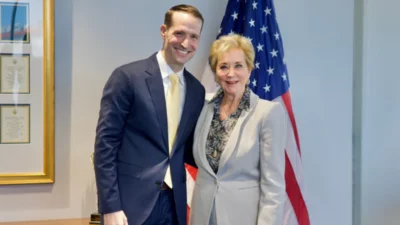Ask Paul Klas, MD, where he felt most in his element while practicing in Gundersen Health System’s Family Medicine Residency Program, and the answer might surprise you.
Dr. Klas, whose retirement commenced on Oct. 3 after 15 years at Gundersen, found his passion on the street, working with the unsheltered population in La Crosse as a member of the Street Medicine team, which he played an integral part in creating at Gundersen.
Dr. Klas began his career at Gundersen Onalaska Clinic, and at that time, became the division head for the Department of Family Medicine, a role he held until about nine years ago when he was asked to become the program director of the Medical Residency Program – a position he was always drawn to. He saw it as an inroad to serving the underserved population.
After several attempts to establish partnerships with other organizations to make that happen, Dr. Klas eventually connected with Sandy Brekke in the Office of Population Health and formerly of St. Clare Health Mission. Brekke had spent a year on the street caring for the unsheltered population at the height of the pandemic.
“What I was looking for was a partnership, but to do that, you need someone the community trusts, and Sandy then became that bridge,” Dr. Klas said. “This is just what I was looking for.”
After learning about Brekke’s work and realizing his goal of bringing medicine to people who experience barriers to getting it, the two joined forces. Though meeting people where they are was the primary goal, as director of Medical Residency, Dr. Klas also sought to teach younger clinicians care and compassion for those living on the street.
“Our big goal was not just to be out there, because we could do that ourselves, but our goal was to touch the hearts of young physicians,” Dr. Klas said. “In our residency training, there’s a real emphasis on community, and I believe Gundersen wants to be involved outside our walls in making the community better. We’re here to enrich every life.”
So each Wednesday morning, Dr. Klas and his team visited people at the Salvation Army, then made their way to Cameron and Houska Parks, plus occasional stops at parking garages or encampments where they know people were congregating. At those locations, they attempt to first connect people with health insurance to invite them into a medical facility where more comprehensive treatment can take place. If that’s not an option, the team can carry out simple procedures like checking for abscesses using a portable ultrasound machine, distributing antibiotics and inhalers, caring for wounds, and joint injections. But it isn’t just about giving out medicine.
“I have a particular interest in seeing our homeless substance abuse patients maybe get into care, because that’s a really hard thing,” Dr. Klas said. “We do find urgencies and emergencies, we try to handle simple things, and then we try to get people into care.”
And these are the kinds of real-life situations Dr. Klas wants residents to experience. He wants them to care for people they wouldn’t normally see because of their mistrust of the health care system. He wants them to understand the barriers the unsheltered face in receiving healthcare, the medical problems they’re dealing with, and most importantly, he wants them to see the humanity in each person they meet.
“You do that by getting down next to them and realizing they have hopes and dreams,” Dr. Klas said. “Then you do what you can. We’re trying to get rid of the bias against our homeless people.”
It’s this sense of purpose, and Dr. Klas’ own experience, that ignited his passion for this work. He points to several markers in his life that prepared his heart for serving those who are often overlooked.
“I was born pretty poor, so I’m not used to ivy tower stuff. I was never hungry, but we were poor,” he said. “Second, I have a faith that compels me to help others, particularly others who are less fortunate. But you don’t have to have a faith to have a heart for this.”
Most of all, Dr. Klas sees the unsheltered as the human beings they are, made no differently than him.
“We’re fellow journeymen on this planet, and … in that tent, there’s a person who has a life and a dream and a hope, but their lives and dreams and hopes are pretty squashed,” he said. “If I can just give them a little comfort and maybe hear their story and maybe help them, that’s worth it to me.”
Now, Dr. Klas looks forward to another chapter of life, while remembering fondly the one he just closed. He’s confident the residency program, and its continued involvement in Street medicine, is in good hands under the direction of Robyn Borge, MD; and Heidi Allred, MD; as well as Sarah Brown, MD; who he said is “at the heart and soul of this.”
“Dr. Borge has as much of a passion for this as I do,” Dr. Klas said. “She has bigger, more expansive plans. This is like the beginning. Mobile medicine and reaching the homeless was just step one.”
He said he’s sad to leave as the program is on the cusp of expanding into something much larger, but he’s satisfied with the seed he planted that’s now flourishing because of the groundwork he laid. Now, though, he’s looking ahead to focus on another area of interest: his grandkids.
“We’ve never been near our grandchildren, so we’re moving to Atlanta, Georgia, where we’ll be 45 minutes from them,” he said, adding that he’ll be teaching part time at a Family Medicine Residency in Atlanta.
Dr. Klas is proud, though, of the program he’s leaving behind.
“I’m so proud of the residents we have here, so I feel good,” he said. “Our residency program has never been stronger than it is today.”
Original source can be found here.



 Alerts Sign-up
Alerts Sign-up